Iran’s Growing Influence in Yemen
Yemen’s Minister of Information, Culture, and Tourism, Muammar al-Eryani, has publicly criticized the Houthi militia’s celebration of the Iranian envoy, Ali Mohammad Ramazani, marking a significant moment three years after the death of the military governor Hassan Irloo. Al-Eryani interprets this event as a clear sign of the Houthis’ isolation and the international community’s unanimous support for the legitimate government and rejection of the coup. He views it as the beginning of a new phase of direct Iranian guardianship over the Houthi’s political and military decisions.
Iran’s Continued Interference
In a press statement, al-Eryani accused the Iranian regime of reaffirming its full support and sponsorship of the Houthi coup through this gesture. He condemned Iran’s ongoing interference in Yemeni affairs and its blatant aggression against the Yemeni people, which has persisted for a decade. Al-Eryani highlighted Iran’s use of Yemeni geography to further its destructive policies, spread chaos and terrorism, and destabilize the security and stability of the region, posing a serious threat to international interests.
Houthis as Iran’s Proxy
Al-Eryani stressed the global consensus that the Houthi militia is merely a tool for Iran’s expansionist project, lacking genuine autonomy in political, military, or administrative decisions. He pointed out that Iranian Revolutionary Guard leaders in Sana’a directly oversee the administration of areas under Houthi control, further emphasizing Iran’s influence.
Warnings of Escalation
The minister warned of a new wave of escalation following these developments. He noted the timing of the Iranian Revolutionary Guard’s tightening grip on the Houthi decision-making process under the guise of radical change. Al-Eryani also highlighted the escalation of terrorist attacks on commercial vessels and oil tankers, including the attack on the Greek oil tanker MT DELTA SOUNION, carrying 150,000 tons of crude oil.
Call to International Community
Al-Eryani urged the international community to fulfill its legal responsibilities by taking decisive action against the Iranian regime’s expansionist policies, export of the Khomeinist revolution, and creation of sectarian militias. He argued that these actions have led to political, economic, and humanitarian crises, destabilized regional security, provided safe havens for terrorist organizations, and now pose a serious and imminent threat to regional and international peace and security.
The minister’s statements underscore the complexities of the Yemeni conflict and the broader geopolitical tensions in the Middle East, highlighting the need for concerted international efforts to address the root causes of instability and support a path towards peace.
To follow the news in Arabic
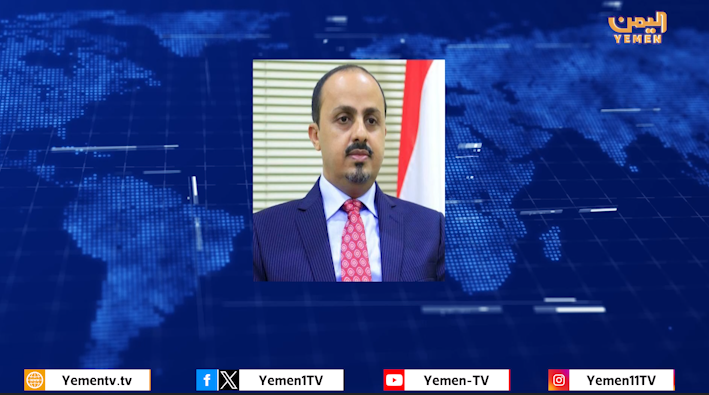
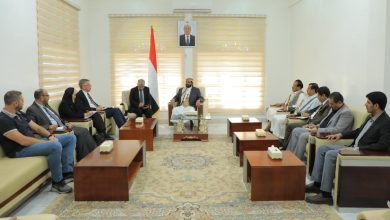 Al-Aradah discusses military and security developments with the UN envoy’s military advisor and their impact on the peace process.
Al-Aradah discusses military and security developments with the UN envoy’s military advisor and their impact on the peace process.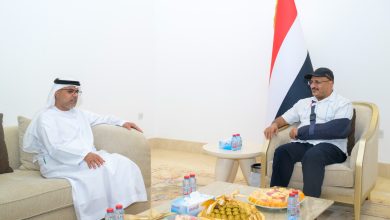 Tariq Saleh discusses the latest developments with the UAE ambassador.
Tariq Saleh discusses the latest developments with the UAE ambassador.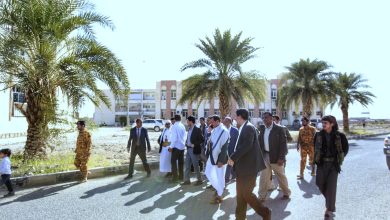 Mareb officials and the Technical Education Authority launch the furnishing of the Community College, funded by Kuwait.
Mareb officials and the Technical Education Authority launch the furnishing of the Community College, funded by Kuwait.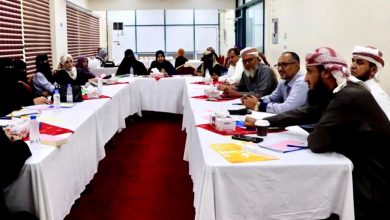 Workshop on violence against girls concludes in Aden, focusing on awareness and prevention strategies.
Workshop on violence against girls concludes in Aden, focusing on awareness and prevention strategies.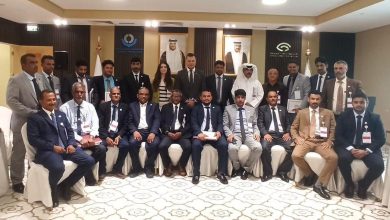 Training customs personnel in Qatar on monitoring strategic goods.
Training customs personnel in Qatar on monitoring strategic goods.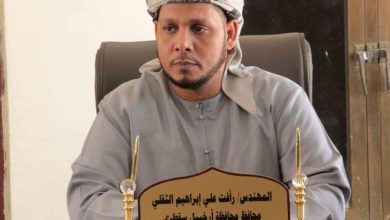 Al-Thuqali discusses efforts to document the Socotri language and directs preparations for the heavy vehicles site at the port.
Al-Thuqali discusses efforts to document the Socotri language and directs preparations for the heavy vehicles site at the port.